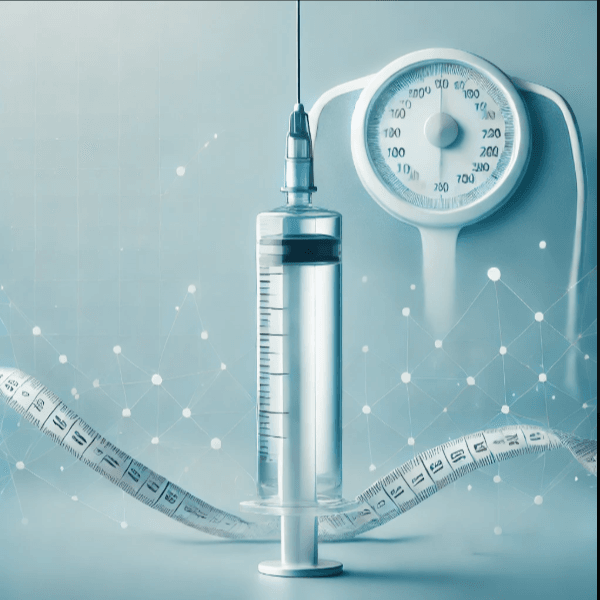Understanding Weight Loss Injections
Weight loss injections have gained considerable attention in recent years. They are often marketed as a solution for those struggling to lose weight through traditional methods. These injections include various substances designed to promote weight management, with some of the most prominent types being GLP-1 agonists, vitamin B12 injections, and lipotropic injections.
GLP-1 (Glucagon-Like Peptide-1) agonists, such as semaglutide and liraglutide, are medications initially developed for diabetes management. They work by mimicking the increasing hormones the body produces to regulate blood sugar and appetite naturally. These injections help individuals feel full more quickly after eating, which can lead to reduced caloric intake. Over time, this promotes weight loss, making GLP-1 agonists one of the most popular options for weight management.
Vitamin B12 injections, on the other hand, are often marketed to boost energy levels and improve metabolic function, which may indirectly support weight loss. Though a vitamin B12 deficiency can lead to fatigue and hinder physical activity, the effectiveness of these injections for weight loss remains debatable and is often considered a supplementary approach.
Lipotropic injections, a mixture of several nutrients, promote fat loss by enhancing liver function and aiding the body’s fat-metabolizing processes. These injections typically include a combination of methionine, inositol, and choline, which are believed to assist in the breakdown of fats and the removal of toxins. The marketing of these injections often emphasizes their role in improving fat loss alongside diet and exercise.
The evolution of weight loss treatments can be traced back to the early 20th century when appetite suppressants and fat-burning drugs entered the pharmaceutical landscape. With advancements in medical research and technology, modern weight loss injections continue to generate interest and discussion among health professionals and patients alike, prompting a reevaluation of their potential effectiveness and safety.
The Science Behind Weight Loss Injections
In recent years, weight loss injections have garnered significant attention as potential solutions for obesity and weight management. These injections typically contain active ingredients such as hormones, peptides, or other compounds that influence metabolic processes within the body. Numerous studies have been conducted to evaluate the effectiveness and safety of these injections, often focusing on their ability to promote weight loss by altering biochemical pathways related to appetite regulation and fat metabolism.
One of the most widely studied weight loss injections is the glucagon-like peptide-1 (GLP-1) receptor agonist. Research has shown that GLP-1 increases insulin secretion in response to meals, enhances satiety, and slows gastric emptying. A clinical trial published in a prominent journal demonstrated that GLP-1 injections experienced significant weight loss compared to placebo participants. This underscores the role of hormonal regulation in facilitating weight reduction through injectable treatments.
Another notable example of weight loss injections includes the use of lipotropic agents, which are designed to enhance fat metabolism and promote the removal of fat from the liver. Studies examining the efficacy of these agents have reported varying degrees of success, with some participants achieving notable weight loss results when combined with a structured diet and exercise program.
However, it is crucial to differentiate between clinically validated weight loss injections and those lacking substantial evidence. Although many products claim to offer weight loss benefits, rigorous clinical trials and peer-reviewed research are essential for determining their safety and efficacy. Potential side effects, ranging from mild gastrointestinal issues to more severe complications, must also be carefully considered by individuals contemplating these treatments.
The intricacies of metabolic pathways targeted by these injections highlight the importance of scientific inquiry in evaluating their potential benefits. As this field evolves, ongoing research will continue to clarify the actual results versus the hype surrounding weight loss injections.
Common Myths and Misconceptions
Weight loss injections have garnered attention as potential aids in weight management. However, myths and misconceptions surrounding these treatments can cloud judgment and hinder informed decision-making. One prevalent misconception is the expectation of rapid results, leading many to believe that weight loss injections deliver instant gratification. While they can support weight loss efforts, they are most effective when integrated with a comprehensive approach that includes a balanced diet and regular exercise. Results may vary widely among individuals, and sustainable weight management typically requires patience and commitment.
Another widespread myth is the belief that weight loss injections can function as a standalone solution, effectively replacing the necessity for a healthy lifestyle. This notion may lead individuals to ignore the importance of dietary changes, exercise, and overall lifestyle improvement. Health professionals universally advocate for a multifaceted approach to weight loss, emphasizing the significance of maintaining a nutrient-rich diet and engaging in physical activity. Injections should not be viewed as a magical solution; instead, they complement a holistic lifestyle focused on health and wellness.
Concerns regarding the safety and approval of weight loss injections often contribute to the scepticism surrounding their efficacy. Some individuals falsely believe that these injections are not regulated or have not undergone adequate clinical evaluation. In truth, many weight loss injections utilized today have received endorsement from health authorities and adhere to stringent safety standards. While it is essential to be cautious and consult healthcare professionals before starting any new treatment, dismissing these injections entirely due to misinformation can prevent individuals from exploring potential options for weight management. Understanding these myths helps create a clearer perspective on the role of injections in achieving weight loss goals.
Actual Results: Testimonials and Expert Opinions
Weight loss injections have gained popularity among individuals seeking swift and effective means of shedding pounds. Many users report notable weight loss results, with numerous testimonials highlighting their transformative journeys. For instance, one recipient of weight loss injections shared that they lost a significant amount of weight in just a few months, leading to improved self-esteem and increased physical activity levels. Such accounts often describe not just a change in numbers on the scale but also a profound shift in overall well-being, with enhanced energy and mood.
However, it is important to contextualize these success stories within a broader framework of understanding. Not all experiences with weight loss injections are positive. There are cases where individuals did not achieve the anticipated results or faced side effects that tempered their enthusiasm. These varied outcomes highlight the necessity of personalizing treatment plans and underscore the importance of realistic expectations. According to healthcare professionals, weight loss injections can be beneficial for specific populations, particularly those who struggle with obesity-related health issues. A qualified physician can determine if an individual is an appropriate candidate based on their medical history, current health status, and readiness to integrate lifestyle changes.
Experts emphasize that weight loss injections should not be considered a standalone solution. They are most effective when incorporated into a comprehensive weight management strategy that includes a balanced diet and regular exercise. This holistic approach ensures that individuals lose weight and adopt long-term habits conducive to overall health. Therefore, while testimonials can offer inspiration and insight, they must be balanced with professional guidance to foster a balanced understanding of weight loss injections’ efficacy and realistic outcomes.


